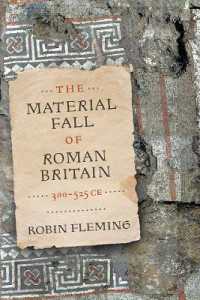Full Description
In Unbound in War?, Sean Richmond examines the influence and interpretation of international law in the use of force by two important but understudied countries, Canada and Britain, during two of the most significant conflicts since 1945, namely the Korean War and the Afghanistan Conflict. Through innovative application of sociological theories in International Relations (IR) and International Law (IL), and rigorous qualitative analysis of declassified documents and original interviews, the book advances a two-pronged argument.
First, contrary to what some dominant IR perspectives might predict, international law can play four underappreciated roles when states use force. It helps constitute identity, regulate behaviour, legitimate certain actions, and structure the development of new rules. However, contrary to what many IL approaches might predict, it is unclear whether these effects are ultimately attributable to an obligatory quality in law. This ground-breaking argument promises to advance interdisciplinary debates and policy discussions in both IR and IL.
Contents
Acknowledgments
1. Introduction
Introduction
Organization of the book
2. Existing Literature, Research Design and Case Selection
International law and the use of force
Research design, method, and premises
Case selection
a) Why focus on Britain and Canada?
b) Why focus on the Korean War and Afghanistan Conflict?
3. Theoretical Framework
Introduction
How should we conceive of international law - as rules or process?
International law in the study of international relations
a) Realist approaches
b) Neo-liberal institutionalism
c) Constructivist perspectives
The "interactional" approach
Positing the four roles of international law in the use of force by states
4. Britain and the Korean War
Introduction
Brief background to the Korean War
Why Britain participated in the Korean War
The four roles of international law in Britain's use of force in Korea
a) Constitutive
b) Regulative
c) Permissive and legitimating
d) Structuring the development of new rules
The understanding of international law in Britain's use of force in Korea
a) Britain's interpretation of the Security Council resolutions on the Korean crisis
b) Britain's interpretation of Article 118 of the Geneva Convention on POWs
Key findings
5. Canada and the Korean War
Introduction
Why Canada participated in the Korean War
The four roles of international law in Canada's use of force in Korea
a) Constitutive
b) Regulative
c) Permissive and legitimating
d) Structuring the development of new rules
The understanding of international law in Canada's use of force in Korea
a) Canada's interpretation of the Security Council resolutions on the Korean crisis
b) Canada's interpretation of Article 118 of the Geneva Convention on POWs
Key findings
6. Britain and the Afghanistan Conflict
Introduction
Brief background to the Afghanistan Conflict
The three phases of Britain's military participation in the Afghanistan Conflict
Why Britain participated in the Afghanistan Conflict
The four roles of international law in Britain's use of force in Afghanistan
a) Constitutive
b) Regulative
c) Permissive and legitimating
d) Structuring the development of new rules
The understanding of international law in Britain's use of force in Afghanistan
a) Britain's understanding of the UN Charter and NATO treaty
b) Britain's interpretation of international human rights law
Key findings
7. Canada and the Afghanistan Conflict
Introduction
The three phases of Canada's military participation in the Afghanistan Conflict
Why Canada participated in the Afghanistan Conflict
The four roles of international law in Canada's use of force in Afghanistan
a) Constitutive
b) Regulative
c) Permissive and legitimating
d) Structuring the development of new rules
The understanding of international law in Canada's use of force in Afghanistan
a) Canada's understanding of the NATO treaty and UN Charter
b) Canada's interpretation of the Geneva Convention on POWs
Key findings
8. Conclusion
Summary of findings
Significance of findings for theory and future research
Bibliography
Index







